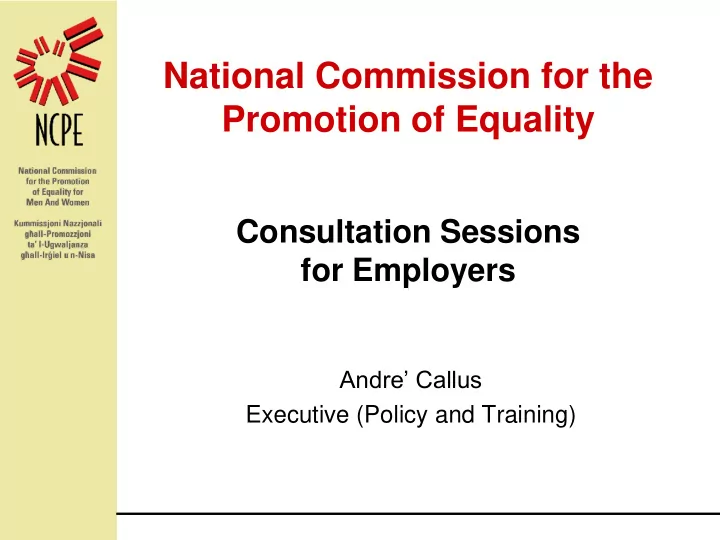

National Commission for the Promotion of Equality Consultation Sessions for Employers Andre’ Callus Executive (Policy and Training)
Work-Life Balance Culture The role of line managers and HR is particularly crucial when developing and sustaining a work-life balance culture: • Develop open lines of communication • Understand the issues faced by each employee • Role model • Demonstrate genuine concern, empathy and trust in employees • Facilitate and empower HR should support work-life balance through the introduction of imaginative and appropriate policies and guidelines and by creating training programmes to support and empower managers and ultimately employees in their quest for work-life balance .
Monitoring & Communication Tools 1. Hubstaff for virtual employee time tracking
Monitoring & Communication Tools 2. Skype for voice and video calls
Monitoring & Communication Tools 3. Dropbox for online cloud storage
Monitoring & Communication Tools 4. Google Calendar for schedule organization
Monitoring & Communication Tools 5. Shoeboxed for expense tracking
Monitoring & Communication Tools 6. Yammer for communication and social
Drafting a Work-Life Balance Policy
Main Points • Purpose of policy • Definitions • Importance of FFMs • Non-discrimination • Exigencies of work/organisation • Assign roles/responsibilities • List of FFMs offered • Procedure for request/evaluation • Formal agreement • Review
Public Administration Teleworking Policy • Appendix 12 of the Manual on Work- Life Balance Measures (available online)
Establishing Specific Policies - e.g. Job Share The following are some suggested policies and best practices: • Be clear that management may approve or terminate a job sharing arrangement at any time. • Decide what will happen if one job sharer is terminated, resigns, or goes on extended leave. You may indicate in the employment contract that the remaining job sharer could be required to work fulltime until a replacement is found. • Issue each person an employment contract which stipulates job sharing conditions including expected hours of work, general schedule expectations, and procedures for changes or substitutions. • Vacation and income are proportional to hours worked.
Establishing Specific Policies - e.g. Job Share • While job sharers may be jointly responsible for assigned work, each person should be evaluated individually according to his/her own performance standards. • While job sharers may be jointly responsible for assigned work, one individual should not be liable for another’s neglect. Encourage job sharers to report concerns to their supervisor promptly. • Benefits are consistent with those for other part-time workers in your employ. • While job sharers should be encouraged to fill in for each other, they are not required to compensate for illness and other unplanned absences.
THANK YOU National Commission for the Promotion of Equality Gattard House, National Road Blata l-Bajda HMR 9010 Tel: 25903850 Email: equality@gov.mt Website: www.equality.gov.mt
Recommend
More recommend